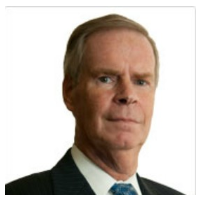
OMB’s Mader confident CFO community will weather transition
The Office of Management and Budget Controller David Mader says the chief financial officers community will handle the presidential transition just fine, thanks...
Federal chief financial officers are afraid of the changes that come with a new administration, but Office of Management and Budget Controller David Mader says there’s no reason to be scared.
Mader said the transition is not a cause for panic thanks to efforts like embracing shared services, getting involved in the budget process, learning from enterprise risk management (ERM) and the ongoing implementation of the Digital Accountability and Transparency Act (DATA Act).
“I think what we do as a community is basically just good government,” Mader said during a Nov. 30 event in Washington to mark the release of the annual CFO survey from the Association of Government Accountants (AGA) and Grant Thornton. “I expect that an incoming administration is going to look at what we did, maybe they adjust the emphasis, but striving for adherence to all the requirements. Change is like OK, we’re going to have new people sitting in new chairs, not only at OMB but in many of the major departments. We’re going to have to figure out who they are, what their priorities are, but we’ve done this before, especially the career people that have done it multiple times. We’ve been through it before as a community, and I think that the transition will just play out like every other transition.”
The survey results were collected over the summer via an online survey and several in-person roundtables.
According to the survey overview, “Survey respondents did not express undue alarm over the notion of welcoming new leaders to their organizations.”
“When digging a little deeper, though, there is a clear fear that a new administration will either take a different path or slow progress that would diminish the benefits of ongoing initiatives,” the survey stated.
One ongoing initiative that involves CFOs is the implementation of the DATA Act.
The DATA ACT, which standardizes federal financial reporting, is set for full implementation in May 2017. Mader said during the survey event that he thought “we’re in really good shape” for the roll out, thanks to collaboration with the Treasury Department and the work agencies put into their action plans.
“I’m feeling very good that May of ’17, we’re going to be able to say we met the mandate of that legislation,” Mader said. “There are particular bureaus, components within agencies that have unique challenges, but I think we can say, ‘Yep, but we know if you’re not going to be there in May, you’re going to be there … pick a month in the future.'”
According to the survey, 33 percent of CFOs said the DATA Act was the initiative that showed the most success in implementation, followed by shared services at 32 percent and Circular A-123 at 26 percent.
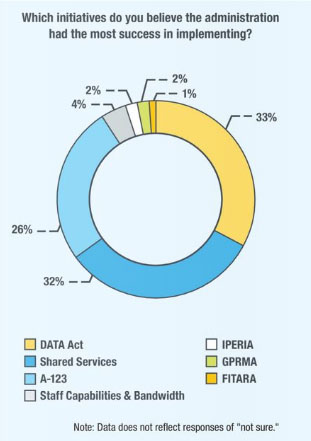
In July OMB released a long-awaited update to Circular A-123, now known as Management’s Responsibility for Enterprise Risk Management and Internal Controls. It introduced a governmentwide risk management program, and it updated the internal controls program to better align with recent changes made by the Government Accountability Office.
About 42 percent of surveyed CFOs said moderate progress was made for ERM, during the current administration, while about 24 percent and 25 percent felt significant and some progress was made, respectively, when it comes to risk management.
“Come next May, June, each agency will have a comprehensive risk assessment of their programs,” Mader said. “I can’t think of a better way to sort of set a new administration than to have that data available for an incoming secretary, an incoming OMB, so they have an assessment of, OK, we need to pay attention to this, or we need to pay attention to that.”
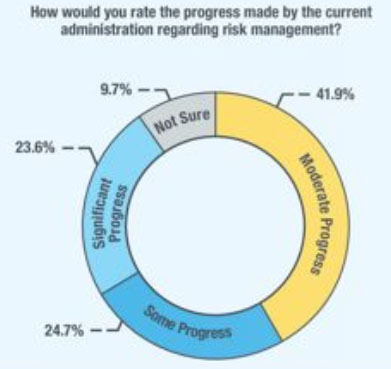
Mader said the role of CFOs has changed over time, driven in part by technology and shared services.
Shared services are activities like information technology, human resources and financial, found in agencies governmentwide.
According to the survey, about 43 percent of CFOs said the Obama administration had made some progress on shared services, compared to 24 percent who said moderate progress was made, and 16 percent who believed significant progress had been made.
“As you find other ways to do a lot of this processing work, it gives us as a community an opportunity to do more,” Mader said. “We talk about the DATA Act. I think people now are starting to see wow, we’re going to have a lot more data than we’ve ever had. We now have a way of looking at data in a way very different than we’ve looked in the past. I think, whether it’s the the DATA Act or enterprise risk management, I think those set the stage for the CFO community and the CFOs to think about their job in a very different way.”
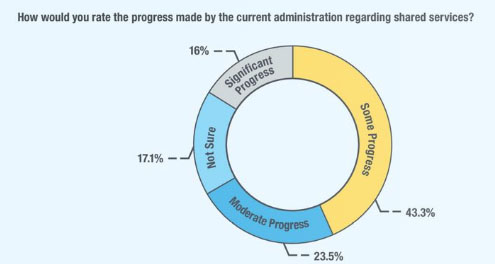
When it comes to budget reform, 38 percent of CFOs surveyed said the Obama administration had made some progress, while 33 percent said moderate progress was made.
Mader said he believes there is a way to design a multi-year budget that still allows congressional input.
“Personally, I think it’s something that we should try and see how it works,” Mader said. “I think you could work it out. I really do.”
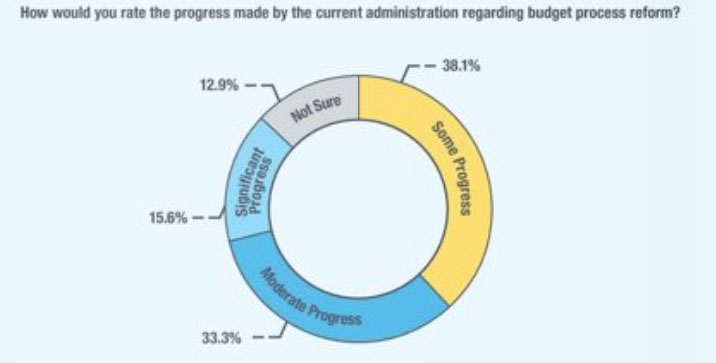
Mader also said CFOs need to have some contact with an organization’s budget if they want to play a role as a key adviser to a CEO.
“From planning for my budget to then actually, successfully executing my budget, and during that process being able to assess what are the investments that you need to make, what are the risks that are inherent in those investments and how do you execute it,” Mader said. “When you think about the responsibility of financial management, agencies don’t run if we can’t successfully execute the budgets and we can’t account for them, and we can’t complete a financial audit at the end of the year. So to me the challenge is, do we want to step up and sort of be that lead C-suite person.”
Copyright © 2024 Federal News Network. All rights reserved. This website is not intended for users located within the European Economic Area.
Related Stories





